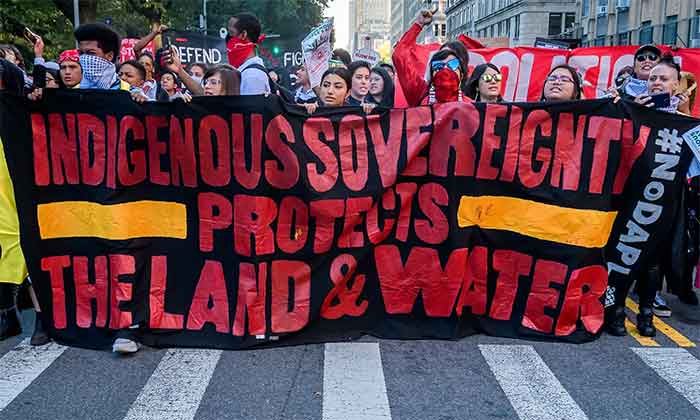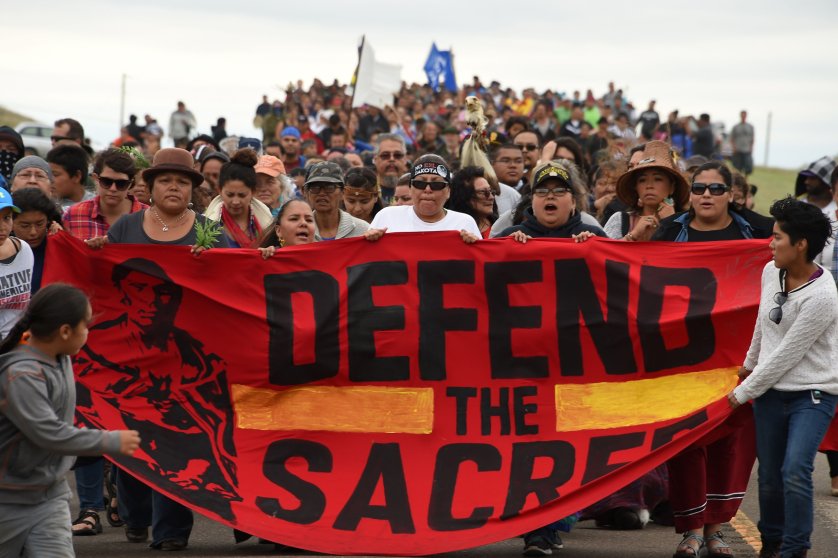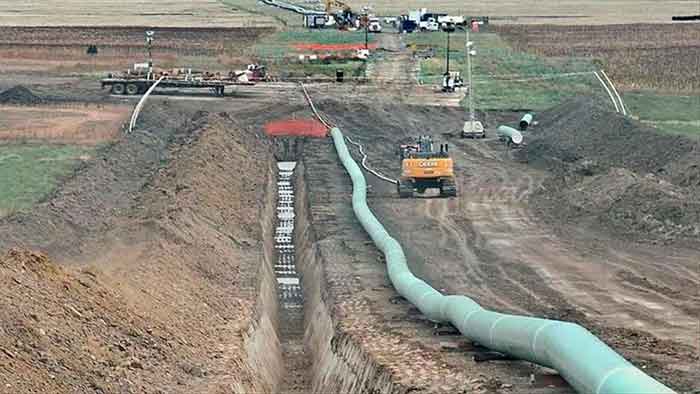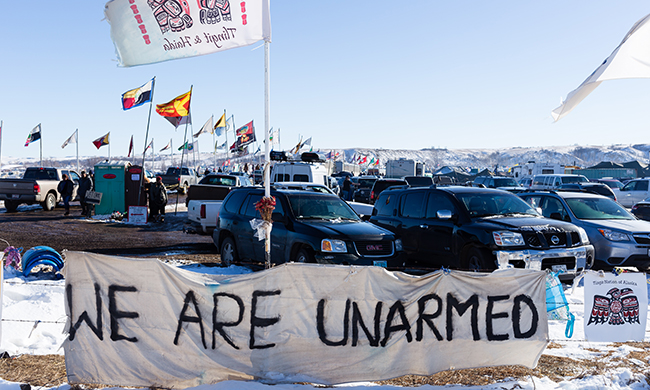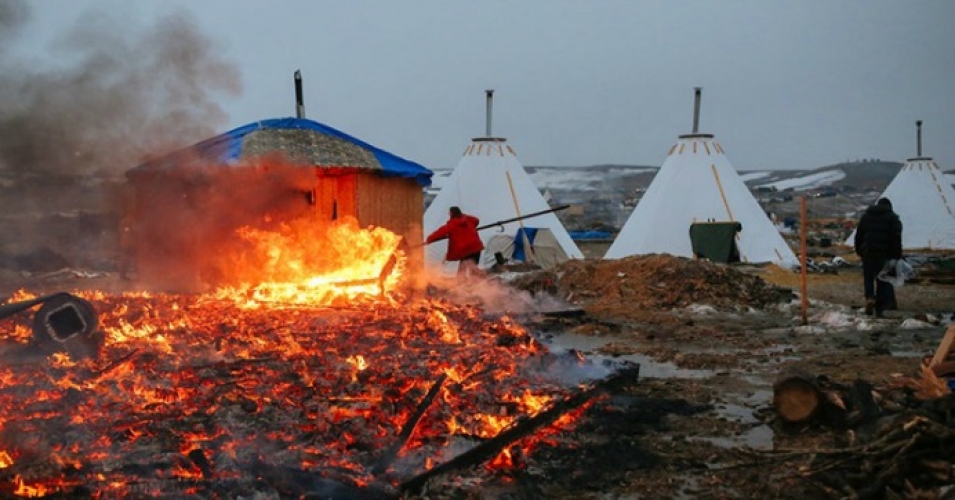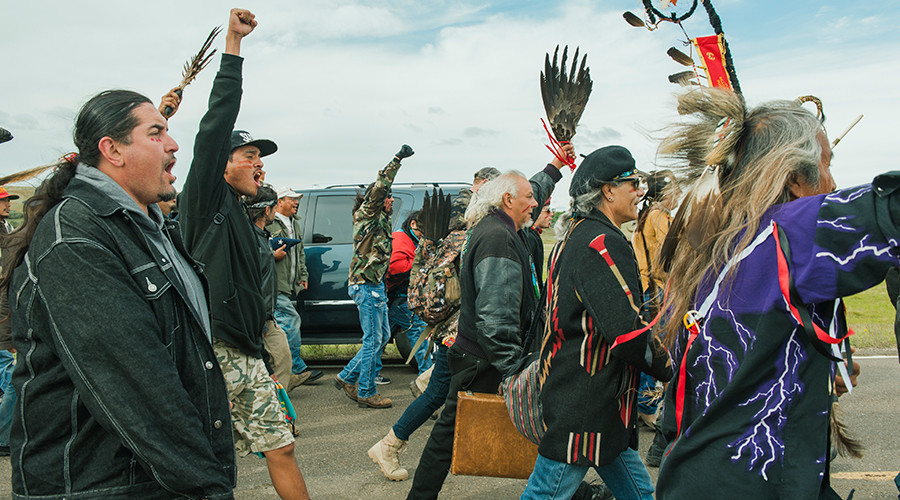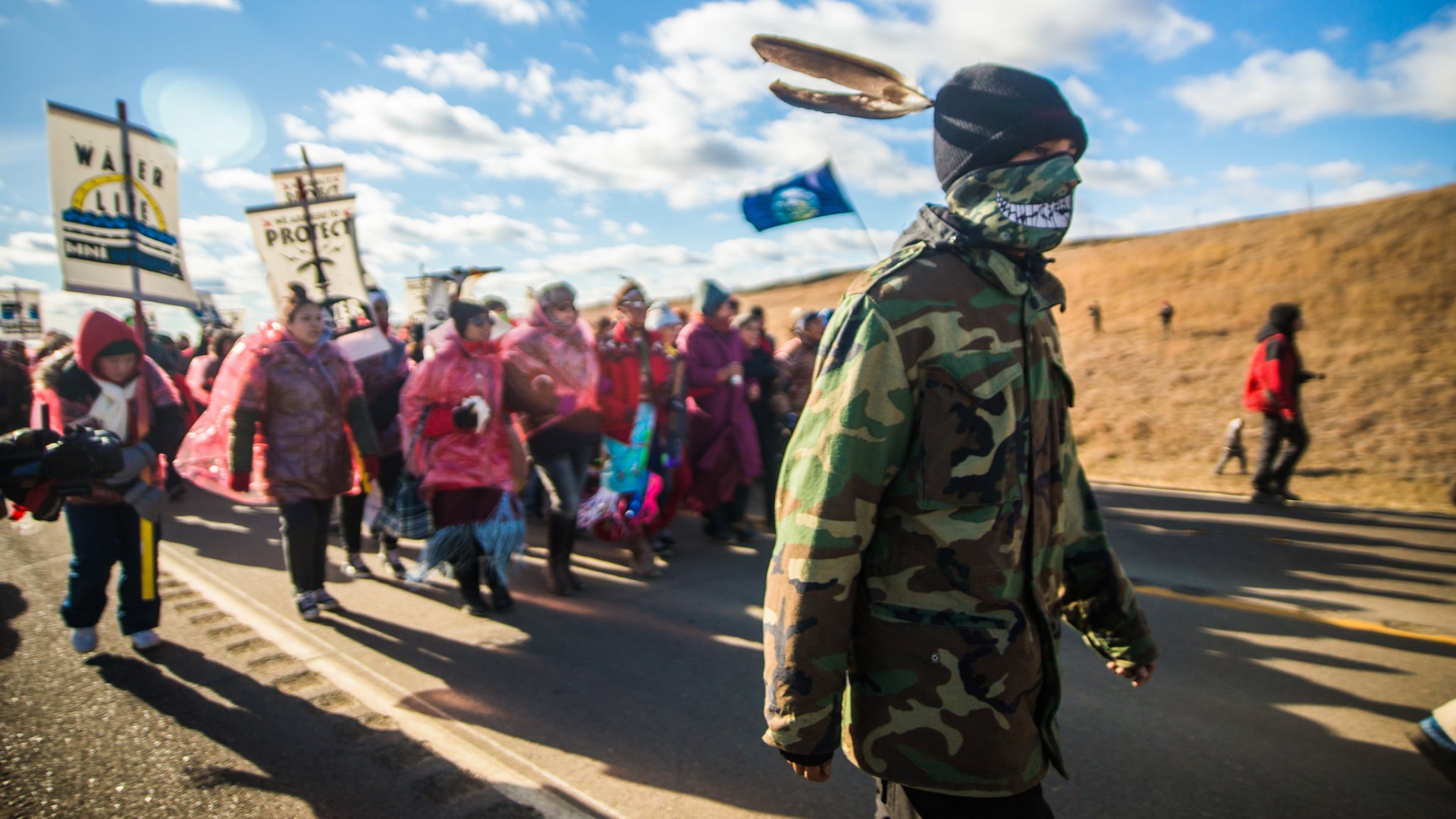
by Frank Barat & Vidal Cuervo
With the announcement that the Dakota Access Pipeline will be re-routed, the water protectors at Standing Rock might have won a battle but they have not yet won the war. Despite blizzards and deadly temperatures, they are still at the camp and many more are pouring in to help.
In this interview, Eryn Wise, media coordinator for the Standing Rock camp, explains the reasons behind their actions, puts the importance of Standing Rock in the context of the broader fight for indigenous rights, and tells us that they are here to stay.
This interview by Frank Barat and Vidal Cuervo was originally published in French in Revue Ballast.
This is the first time since the 1970s that so many native American nations have come together to oppose corporate depredation on the land, although there have been many occasions to do so. What makes this struggle so special ? Why come together only now?
I think that first of all it should be noted that the last time there was a gathering of any sizeable means it was not anything in comparison to this. We’ve never seen a gathering of indigenous people this size before, not in Wounded Knee, not at Little Big Horn — there has never been a gathering of this size and magnitude.
For me, you can explain it by the fact that people finally have the power and the ability to say no. We’ve been living underneath the thumb of so many people, and I think people are finally realizing that we no longer have to fear and that, even if we do feel afraid, we are going to fight against it because we do not want to spend our lives in fear the way the generations before us did. I think that it’s integral for everyone to know that a huge part of this story is people reclaiming their power. We have started taking back our power and have essentially said that they took everything from us and that now we are coming back, for our languages, our land, our sacred resources — because you took them from us again, you misuse them and now you don’t deserve them, so we are taking everything back.
Why is the Sioux Nation so attached to this part of the land? Why do you oppose the Dakota Access Pipeline (DAPL) construction?
These are sacred lands for the Sioux people. Sacred resources. They are opposing the DAPL because of the history that lies within the land. It’s so important for people to realize that, while no one else may have ties to their culture and their land, we as indigenous people do. I am frustrated with people who ask us why we care so much, because everyone else has lost their ties to the land and their own culture, which is why people have festivals like Coachella where they wear head dresses and do not understand why it frustrates us — or people who show up and call themselves medicine people when they are not.
Everybody else has lost their ties to who they are as a people, but we have not, and we have been fighting to preserve our way of life and our languages for hundreds of years. And right now that struggle is no different. This water is sacred — all of us come from water, we are born from water in the womb and realize, especially as women, as life givers, that it is our duty to protect that specific resource because it’s something that comes out of our flesh, something that’s the life force behind all things in the world. As indigenous people we recognize the need not only to preserve the land but also the water, because it’s ultimately the life-giver for the entire world. That’s why we call ourselves protectors, not protestors.
Can you explain a bit further this idea of indigenous people being the guardians of the land? You come across this type of narrative in many places around the world, like Australia… Do you feel connected to these other indigenous struggles?
Yes, absolutely. Those are our relatives from around the globe. We understand colonization like many of them do. We understand what it’s like having your way of life stripped from you and being forcibly removed from your lands and your homes. Of course we feel the struggle of people around the globe because we know how it is to fight those fights, to watch people die in the same way, to watch our children be brainwashed into thinking that they are something that they are not, because what they are is not good enough for the people in power.
Every time we realize that something is happening to, for example, our brothers and sisters in the Amazon, every time there is a pipeline spill over there and they are crying out asking for help, we realize what it’s like because we’re out here getting shot and brutalized by police — and all we are doing is asking for help. We definitely stand with people who are fighting around the world, because as indigenous peoples all of us have suffered at the hands of the same people. Maybe not now, but historically they were the same people who went around the globe and took advantage of everyone and everything, essentially took advantage of the generosity of indigenous peoples. Historically you see indigenous people welcoming outsiders who had no clue where they were or how to survive in the situation there were in, and then they took advantage of those people and killed and enslaved them. All of us know that pain, so we fight for each other.
Native people all over the world have this attachment to the Earth, to the land, that seems to puzzle white folks. How would you explain this to them, to make them share this point of view?
If I were to explain why it’s so important to white people specifically, I’d say that you have taken everything else from us and this is the only thing that we have that we know that is a part of us. Roots grow out of our feet and into the Earth and it does not matter how many times white people try to kill us and murder us and put us in the ground — they do not realize that we are of this Earth and that we are going to continue to sprout out. Every time they try to bury us they forget that we are seeds, and that we will keep growing back out, and that we will come back stronger.
Honestly, I do not try to simplify anything for white people. They were colonizers, they killed us, and continue to kill us. I do not feel I need to educate anyone about why it is that I am fighting for this water or why it is that I am fighting for my land, my languages and my people. I’m fighting because I care, and white people are allowed to fight for whatever they want and destroy whatever they want and pull a gun whenever they want, and no one bats an eye. And I feel like if they don’t have to explain why they do what they do, I don’t have to explain why it’s so important for me to wake up tomorrow and have clean water.
Has the movement found grounding or inspiration in similar movements, like in Chiapas, Bolivia or Nunavut?
Honestly, I think that what’s happening here in Sacred Stone is akin to many other resistance movements. You could compare it to a lot of things, but it will never look just like this. None of these movements will ever be quite like the other, and you know we really created an emergent space here — a space that is so different from all the other spaces that I think that have been created. Specifically because it is indigenous peoples in this particular land that are standing up and fighting back, with their prayers and their songs and their ceremonies.
I like to think that people will realize that we are separate from other indigenous peoples and we do have our own voice and our own struggle, but a lot of people want to put us together — like, oh, there’s another tribe doing these things, this other wild group of indigenous people who are fighting back. But here the fight is for the Standing Rock Sioux, it is for the Dakota people who are standing up and saying “no more,” and it’s just all of their allies standing alongside them.
I don’t know if there’s another resistance camp in the world that has over 500 representatives standing behind them. All the time, in camp. We have over 300 of the 566 federally recognized tribes that are here, in camp every single day, fighting with the Standing Rock Sioux. And we have representative from around the globe who have come — people from the Amazon, from Peru, Australia, New Zealand, people from Japan. We have had so many people come, and I don’t know if we can look at any other resistance movement and say that they’ve had that much support.
The outpouring of solidarity with Standing Rock has been incredible and has come from all over the world, and from many different movements: from Palestine and Black Lives Matter, to celebrities, to politicians. How do you explain that? How do you explain that what you’re fighting for is so important to so many people? Do you think the moment is key right now? How do you explain this historical demonstration of solidarity with Standing Rock?
We are at a time in our lives — even though it has taken more than 500 years to get here — where people have slowly but surely realized how much the government has fucked over Native American people, and now, with the internet, people can’t just turn a blind eye to the truths of what happened here, and they can’t just pretend that nothing happened, despite the media blackout that we’ve been experiencing, and because there are eyes on Standing Rock and the people coming here realize that severe injustice has been done. It’s not just something that our history teacher just chose not to tell us about; no, its happening right now! I can watch it. I can see it. I can see these kids being shot. I can see these Elders being beaten up.
And so it’s impressing on people that they have a duty as human beings — not as a race, creed or anything else, just as human beings — to display a solidarity and humanity. And it shows people that the world isn’t as ugly as we believe. Some are showing up because they realize that this is a once-in-a-lifetime opportunity to see people who have been oppressed for so long rise and reclaim what has been lost before, and many people are honestly here not only to assist us but also to watch. Because it’s really an incredible place to be and an incredible sight to witness, especially for people who have never had a culture of their own, apart from Thanksgiving or Christmas, to sit here and watch people in ceremony. People are here because they’re sick of not being moved by anything else in their lives. Half the people have come here to help for a weekend and haven’t left in months — myself included.
It’s because there’s something sacred here, because there’s something happening here that’s worth being here for. People realize it’s a way of life that never should have been tampered with, taken away from anyone, never been destroyed. A lot of people are just grateful for that.
So are you saying that capitalism and neoliberalism have, in a way, brainwashed people in thinking that the sacred doesn’t exist anymore? And that they are now experimenting with another world in which the sacred, community, and solidarity are more present?
That’s absolutely what I’m saying: what is your tie to the land you a walk on, what is your specific relation to the land that you walk on? When you take a sip of water, do you wonder where it comes from? Do you think of the many miles it’s traveled, of the process it went through to make it to your tap? Every day that goes by, do you look at the birds in the trees? Do you feel the Earth beneath your feet?
I absolutely believe that capitalism and colonization have destroyed people. People are so self-obsessed and so concerned about collecting things, about hoarding things, that they don’t realize that there are so many things that are free, so much more beautiful than anything they can buy. When people start to remember that the connection to the Earth is so much more important than anything else, they will start to take action and find other ways to preserve the Earth.
Colonization, ethnic cleansing and genocide have massacred and touched indigenous people, but in a way also its perpetrators. The oppressor has also, through his murders, been hurt. Would you agree with this?
Absolutely. How can you destroy whole nations of people, kill off entire languages, make a people go extinct (which has happened)? How can you do that and not lose something in return? Not just your humanity and not just your spirit, but even your connection to living things. If you’re able to kill off an entire group of people, I could not for a moment believe that you have any shred of humanity left in you, any ability to look upon the beauty of the Earth around you, and appreciate it, if you are so cavalier about human life.
A lot of people here don’t even realize the extent of this. Some say: “I didn’t do it. Those weren’t my ancestors.” Okay, maybe not your ancestors here in the United States, maybe they weren’t the ones who committed genocide, but they sure as hell figured out how to get everybody else around the globe… There are so many people who don’t want to acknowledge their own history. Knowing how our history hurts us, at least we’re honest about it: we know what happened to us. We can say the word “genocide” without flinching. We can find reasons to live and laugh and love, despite what’s happened to us. Even though our oppressors can sit there and pretend that nothing ever happened and that they were never part of it. And whether or not they want it to be, that’s what their history is.
Every single person here in the US who is not indigenous to this place or who wasn’t forcibly brought here on slave ships, or people who were fleeing oppression — and even those — their ancestors had a hand in other things. We say that the bad things you do will come back at your family, maybe not in the next generation, but they will come back. So I think that the people who destroyed so many nations, raped so many women, killed so many children, destroyed so many homelands, that this is the curse that has been brought on their children.
The people who live here don’t understand why they don’t have a culture, or why they don’t have an appreciation for their languages, or why they don’t know anything about their homelands: that’s their curse. They stole everything from everyone else, and so that’s why they get to be lost forever. That’s why white people take everything from every culture. They’ve been cursed in that they don’t know their own way home. Maybe that’s their culture now, that’s their identity: stealing from other people and trying to reclaim something that isn’t theirs. If that’s the case, maybe people should invest in figuring out who they are, acknowledge their history.
Going back to struggles, activists of the past such as John Trudell or Russell Means were quite articulate about the connections between capitalism and the oppressions of minorities. Do you think that the present movement can endure without strong political and theoretical grounding? And also, do you think that appealing only to people’s goodwill will be enough in the long run?
I think if there’s any hope for the future for the human race, for the globe, I think we have to appeal to their humanity, we have to remind them that it’s still there. Some people think that we’re ridiculous to be standing out here staring in the face of water cannons and shotguns and rifles, and teargas and mace. They think we’re ridiculous standing out here in prayer. But it was a single prayer spoken by thousands of our ancestors that we would somehow find a way to survive. They repeated that prayer in the darkest of times, when the worst things were happening, and somehow, we’re still here. They, the white men, did everything that they could to destroy us, everything they could think of. And we’re still here. And I truly believe in the power of our prayers. I truly believe in the power of us appealing to humanity.
Now, do I want to fire back at them? Yes. You know they broke my sister’s wrist twice, within a week. I wanted to destroy them. But that’s not how the fight is won. We can’t continue to fight them the way they fight us. Because it doesn’t work, because we don’t have the strength, we don’t have the means to fight them with their own weapons. But we have stronger prayers, and stronger power in our prayers. Essentially I believe that we have so much strength — and the people don’t realize that we do, I want to reiterate this. If we weren’t strong, then how is it that we survived in spite of everything that they did to us?
Here in the US people often think that the only answer is violence, guns, war. It’s a pandemic. So many people around the globe think that the only way you can make your voice heard is by fear-mongering, mass weapon-waving. It’s such an “ego” thing. And you know, we are humble people. We’re not here for anything other than the Earth. We’re not here to kick anybody off our land — even though we should. We’re not there to tell people that they’re less than the sum of their whole. We’re not here to hurt people. We’re here to protect the water, even for the people who come to hurt us.
From the outside it looks like many activists are young and many are women. Historically, the American Indian Movement (AIM) — at least its leadership — was a very patriarchal movement. The Elders had to be consulted on everything. Is this a transformation, or maybe the contemporary expression or evolution of the movement, that we are seeing at Standing Rock?
We still ask the Elders for permission for everything we do, that doesn’t change, that’s how our culture works. You never see the women on the foreground of the great historical battles, but it’s always the women. We are a matriarchal society. Whether or not the warriors are there, because of the prevalence of feminism the movement has begun to publicly uplift women, I guess that’s why you see us more now. But we’ve always been in charge. We’ve always been there. Now people are going to see us, no matter what. We’ve always led these movements, and been the brains behind a lot of things, as most women are. But now we are staking a claim, in our intelligence and in our strength, because it unnerves patriarchal societies to see that women are heading the movement. It really freaks them out to know that women are just as unafraid and just as powerful as men.
When I was in Washington, D.C. with Ladonna, nobody could believe that it was two women leading 5,000 people down Washington Mall. But that’s what it was, and it will continue to be that way because we are the life-givers and we have to protect that which we give life to, which is people. And we have to protect our Mother, because she gives life to the Earth. It’s our duty. Women will continue to uphold their duties.
Has this created any tension inside the camp? Or has it been welcomed by men, especially by those who used to be leaders?
For some men it might be hard — I don’t understand male ego in the slightest, and recognize it in all cultures. But I think that here, men are very respectful of women because they understand what we are, who we are, and the purpose that we serve, and it really unnerves a lot of them to stand against us, so of course they’re supportive because they know the power should they choose to oppose what it is that we’re trying to do as life-givers and mothers.
Back to the campaign on the ground: from Wounded Knee to Standing Rock, the state’s response is always the same: brute force. Like using water cannons and concussion grenades at Standing Rock. What is your response to this, and what will it be if they continue to escalate?
We will continue to pray, because our prayers are powerful. We will never be able to win if we fight them with the same tactics they use. The law is not on our side. We’ll never be able to pull out a gun on a police officer who is shooting us and shoot him and say, “oh it was in self-defense, they were killing us.” I mean, they’re trying to kill us on live TV with thousands of people watching right now, as is, and no one’s showing up. We are not willing to risk life and liberty just to look like them, that’s not how we operate as a people. We know who we are. We don’t need to stand behind weapons in order to gain some semblance of self.
We can pray for them and can protect our land and the water in the way that we know how, the way our ancestors showed us. I don’t want to look like the hate that came to feed on me. I don’t want anyone I know to look like the people who stand in front of us. They were using those water cannons and it was disgusting: they were using the thing, the water, that we revere… I refuse to let that water reflect their evil. And I refuse to use my own self to reflect their evil. Going forward we will continue to pray. The very reason we’re here is to pray. And our very existence is an act of resistance.
We can fight in the peaceful ways we know, and I have faith that it will work out — because for some reason we’re still here, despite everything that they’ve done. No one has died. And if someone does die, our prayers are more powerful than the weapons they carry. And that terrifies them, because they stand there with every single weapon in their arsenal and throw it at us, and yet we stand there with our hands up in the air praying for them. Sitting on our knees praying for them. At the very least they are going home at the end of the night more fucked up than when they arrived in the morning, because they have to answer to themselves for what they are doing to us.
And maybe our weapon is our passive resistance, our prayer. Eventually it will impact them so strongly that they will stop. Or maybe they won’t. But we as a people cannot become them. We have to build a better future, and to me guns are so antiquated a solution. We have to be the ones to say we have to stop with this type of warfare — warfare in general — but especially guns. Weapons being used against unarmed people? That’s happening globally. Unarmed people trying to fight for their lives and their lands and the things that matter to them.
What about the intentions of corporate stakeholders, the state and the media to delegitimize the movement, portraying you as violent, unreasonable… Has this affected the credibility of your struggle? And what credibility do you think you have in public opinion?
Honestly, I don’t care about the public opinion. I don’t care about how they portray us. Because we’ve never been seen — historically — as people. We weren’t even allowed to raise our own children before 1990. Australia didn’t recognize the Aborigines as anything other than animals before the late 1980s. Public opinion is not geared towards me. It’s not an opinion that has been created in light of who I am as a human being. Public opinion is… I don’t care. A lot of people don’t care. The media have been against us since we started. I spend every day reading how they rejoice at how many injuries we’ve had. Public opinion is a deep reflection of a broken community. If people really did care about what the media say — the high-profile arrests, and so on — they would stop coming. And they don’t stop coming: they come in droves.
Everyone knows that the media are full of bullshit and they’re not on the side of the people, they’re on the side of the corporations that pay for them. These corporations have been against us, this country has been against us. If I worry about that, we’re not going to get anywhere. We must look beyond them and continue to find our purpose and find a stake in what really matters.
Obama suggested a re-routing of the pipeline [which has since been confirmed, ed.]. Would you be happy with that, or does this struggle go beyond Standing Rock per se? And has the election of Donald Trump killed any hope that you might have had of help from politicians?
We don’t want to reroute — we want the pipeline to end. If it doesn’t affect this community, it’s going to go somewhere else and affect their community, water, soil… Pipelines are not an answer, and fossil fuels are not a solution for the “energy crisis.” We are already facing a global water shortage, we don’t need to further destroy the land.
As for Trump, he’s not the first white man to come and tell us that we can’t do what we want to do, and that we’ve opposed. We’ve opposed so many others. Andrew Jackson himself wrote the Indian Removal Act, and wrote the words “kill the Indian, save the man.” I’m not concerned about Trump because he is a bully. Bullies are usually very thin-skinned, and prone to lashing out so that no one picks on them, but I’m not scared of him because he’s not the first and won’t be the last. We’re still here, and don’t talk about it, be about it, pray about it. The power of the people is so much greater than that of one person. And the people don’t support Donald Trump.
The more we see white neo-Nazis in the US, the more people are coming out of the woods saying “white pride” and “now’s our time,” “no one has paid attention to us,” “look at all the things we’ve had to suffer from this or that.” They realize that they are the minority and they will get more aggressive. They’re going to get stronger — until we take back what is rightfully ours.

